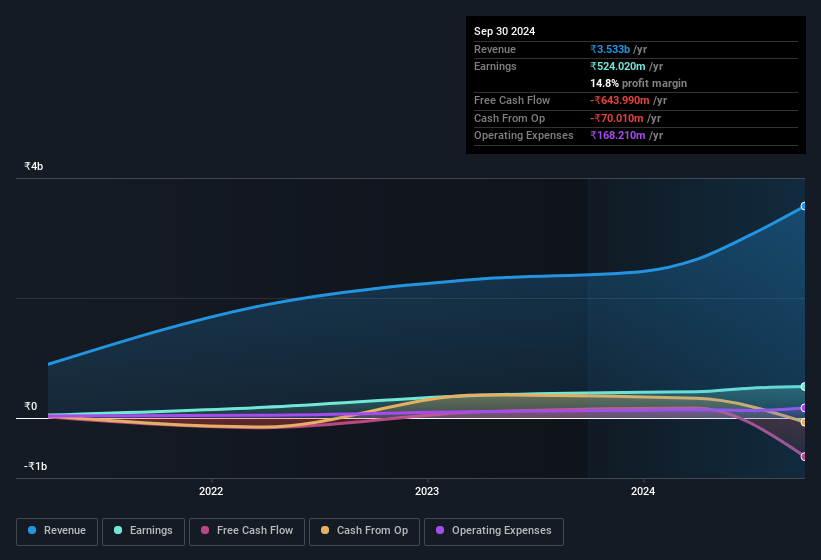Platinum Industries' (NSE:PLATIND) Solid Earnings May Rest On Weak Foundations
Platinum Industries Limited's (NSE:PLATIND) healthy profit numbers didn't contain any surprises for investors. We believe that shareholders have noticed some concerning factors beyond the statutory profit numbers.
View our latest analysis for Platinum Industries

Zooming In On Platinum Industries' Earnings
As finance nerds would already know, the accrual ratio from cashflow is a key measure for assessing how well a company's free cash flow (FCF) matches its profit. To get the accrual ratio we first subtract FCF from profit for a period, and then divide that number by the average operating assets for the period. The ratio shows us how much a company's profit exceeds its FCF.
That means a negative accrual ratio is a good thing, because it shows that the company is bringing in more free cash flow than its profit would suggest. That is not intended to imply we should worry about a positive accrual ratio, but it's worth noting where the accrual ratio is rather high. Notably, there is some academic evidence that suggests that a high accrual ratio is a bad sign for near-term profits, generally speaking.
Over the twelve months to September 2024, Platinum Industries recorded an accrual ratio of 0.82. As a general rule, that bodes poorly for future profitability. And indeed, during the period the company didn't produce any free cash flow whatsoever. Even though it reported a profit of ₹524.0m, a look at free cash flow indicates it actually burnt through ₹644m in the last year. We saw that FCF was ₹134m a year ago though, so Platinum Industries has at least been able to generate positive FCF in the past.
Note: we always recommend investors check balance sheet strength. Click here to be taken to our balance sheet analysis of Platinum Industries.
Our Take On Platinum Industries' Profit Performance
As we have made quite clear, we're a bit worried that Platinum Industries didn't back up the last year's profit with free cashflow. As a result, we think it may well be the case that Platinum Industries' underlying earnings power is lower than its statutory profit. But the good news is that its EPS growth over the last three years has been very impressive. The goal of this article has been to assess how well we can rely on the statutory earnings to reflect the company's potential, but there is plenty more to consider. In light of this, if you'd like to do more analysis on the company, it's vital to be informed of the risks involved. Be aware that Platinum Industries is showing 2 warning signs in our investment analysis and 1 of those is a bit unpleasant...
Today we've zoomed in on a single data point to better understand the nature of Platinum Industries' profit. But there are plenty of other ways to inform your opinion of a company. For example, many people consider a high return on equity as an indication of favorable business economics, while others like to 'follow the money' and search out stocks that insiders are buying. While it might take a little research on your behalf, you may find this free collection of companies boasting high return on equity, or this list of stocks with significant insider holdings to be useful.
New: Manage All Your Stock Portfolios in One Place
We've created the ultimate portfolio companion for stock investors, and it's free.
• Connect an unlimited number of Portfolios and see your total in one currency
• Be alerted to new Warning Signs or Risks via email or mobile
• Track the Fair Value of your stocks
Have feedback on this article? Concerned about the content? Get in touch with us directly. Alternatively, email editorial-team (at) simplywallst.com.
This article by Simply Wall St is general in nature. We provide commentary based on historical data and analyst forecasts only using an unbiased methodology and our articles are not intended to be financial advice. It does not constitute a recommendation to buy or sell any stock, and does not take account of your objectives, or your financial situation. We aim to bring you long-term focused analysis driven by fundamental data. Note that our analysis may not factor in the latest price-sensitive company announcements or qualitative material. Simply Wall St has no position in any stocks mentioned.
About NSEI:PLATIND
Platinum Industries
Engages in the manufacture and sale of poly vinyl chloride (PVC) stabilizers, chlorinated polyvinyl chloride (CPVC), lubricants, stearates, and speciality chemicals in India and internationally.
Adequate balance sheet with very low risk.
Market Insights
Community Narratives




